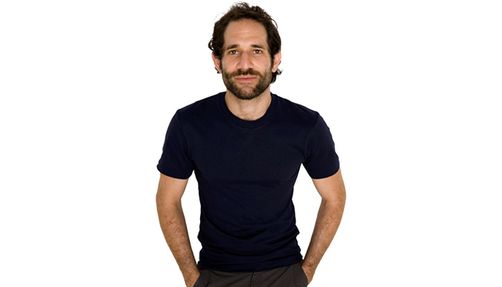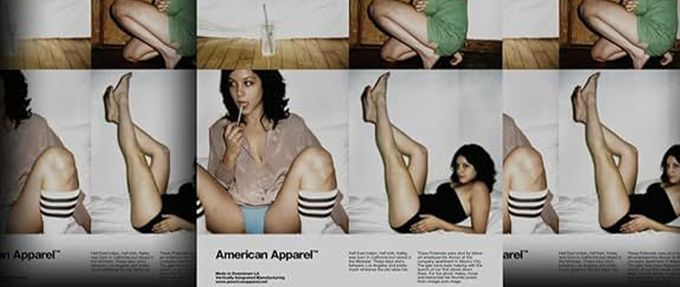“American Apparel is an Industrial Revolution” were the words printed in big block letters on the top floor of the company’s factory in Los Angeles.
“Ethically Made—Sweatshop Free” was its motto in advertisements and news stories. For a time, the clothing company was seemingly synonymous with cheeky sexuality and youth culture, mentioned in songs by Kanye West and Andre 3000, and sold in stores around the world.
A new Netflix documentary, Trainwreck: The Cult of American Apparel, however, explores the meteoric rise and subsequent fall of the once iconic brand, driven in no small part by the actions of its founder and former CEO Dov Charney, who was described by one employee as “manic and crazy,” but “real,” and whose behavior was subsequently at the heart of several lawsuits alleging “egregious” sexual comments and an “intolerable working environment” at American Apparel.
The Rise of American Apparel
Founded in 1989 – when Dov Charney was only 20 years old himself—American Apparel started out making its clothes in South Carolina before moving to Los Angeles, operating first as a wholesaler before expanding to the retail market. By 2005, it was on Inc.’s list of the fastest-growing companies in the United States.
According to Charney, the very things that were eventually to prove American Apparel’s undoing were also what drove its initial success.
The company was known for its sexually suggestive and provocative ads, and Charney argued that the company was open about sexuality because “young people like honesty.”
“This creative environment is what got us to this point,” Charney was quoted as saying. “We certainly aren’t going to stop doing it now after we created a highly profitable company.”
While those provocative ads drove controversy—including one notorious ad that was banned in the UK due to containing material that “could be seen to sexualise a model who appears to be a child”—they also helped build the brand into what it was, with the Adult Video News trade magazine cheekily calling the American Apparel website “one of the finer softcore websites going.”
Trailer: Trainwreck: The Cult of American Apparel
American Apparel Behind Closed Doors

Dov Charney
Photo Credit: WikipediaHowever, the provocative behaviors and sexually-charged atmosphere didn’t end with the company’s ads.
In a 2004 story profile of Dov Charney for Jane, the American Apparel founder became infamous when journalist Claudine Ko described him receiving oral sex from an employee and masturbating during their interview.
“I think sex motivates everything,” Charney told Ko, and it certainly seemed like there was a lot of it going on behind the scenes at American Apparel.
New hires were allegedly sent welcome packets that included a vibrator, while the Netflix documentary shows footage of Charney walking around naked in front of his employees.
Charney had sexual relationships with several of his employees and encouraged “sexually explicit behavior in the workplace.” Nor was he the only one hooking up, according to Ko’s reporting, where she mentions seeing a couple “snuggling in a stairwell” at work.
Of course, former employees of American Apparel also attested that it wasn’t just sexual misconduct that took place within the company.
At the beginning of the Netflix doc, an employee named Carson recounts a time when Charney called him up in the middle of the night and just said “I hate you! I hate you!” over and over.
“That was a regular day at American Apparel,” he says.
The Fall of a Clothing Empire
In 2014, Charney was ousted as CEO of American Apparel in a move that he claimed “blindsided” him.
The stated reason for his termination was that he had repeatedly engaged in conduct that put him in a position to be sued by former employees for harassment, discrimination, and assault.
Writing for the New York Times, Andrew Ross Sorkin said that Charney “should have been gone long ago, face of the brand or not,” and it’s difficult to argue with that assessment, given that Caroline Ko’s initial reporting on Charney’s unorthodox management and sexual malpractice had taken place a decade before his termination.
Pressure had been mounting, however, and by 2012, the company had been hit with at least seven lawsuits relating to sexual harassment, most of which were remanded to arbitration due to employees signing away their right to legal claims against Charney or American Apparel as part of their employment agreements.
Other problems were manifesting behind the scenes, as well, and in 2015, just a year after ousting Charney, American Apparel declared bankruptcy.
In 2017, it was acquired by the Canadian sportswear manufacturer Gildan Activewear, which still markets clothes under the brand.
However, American Apparel’s moment in the sun was over.
Made in America
Though they were sometimes overshadowed by the company’s risqué ads and the inappropriate antics that were going on behind closed doors, American Apparel initially made waves partly by being a vertically integrated company that controlled virtually every aspect of their supply chain, designing and sewing their clothes in the U.S.
Hence their claims of being “Ethically Made—Sweatshop Free.”
Whatever else he was, Dov Charney was an outspoken critic of many of the labor conditions under which modern “fast fashion” was made, speaking against the poor treatment of garment workers and arguing for a “Global Garment Workers Minimum Wage.”
“It’s very different here,” Yesenia Sandoval, a 22-year-old seamstress who worked at American Apparel, told Caroline Ko in that 2004 article.
“This company is much better than [the one she worked at before]. I was receiving minimum wage. Here we earn $12 to $15. I don’t think any company is going to be better than this.”
Despite this, however, the Netflix documentary discloses conditions at American Apparel that “operated pretty much like a sweatshop,” and Charney’s subsequent undertakings since he was ousted from the clothing brand he created have faced considerable scrutiny over labor violations.
After he was terminated by American Apparel, Charney founded Los Angeles Apparel, which was shut down in 2020 due to “flagrant violations of mandatory public health infection control orders” during the COVID-19 lockdowns.
As many as 300 workers were infected with the virus—and four died.
Featured still from “Trainwreck: The Cult of American Apparel” via Netflix
